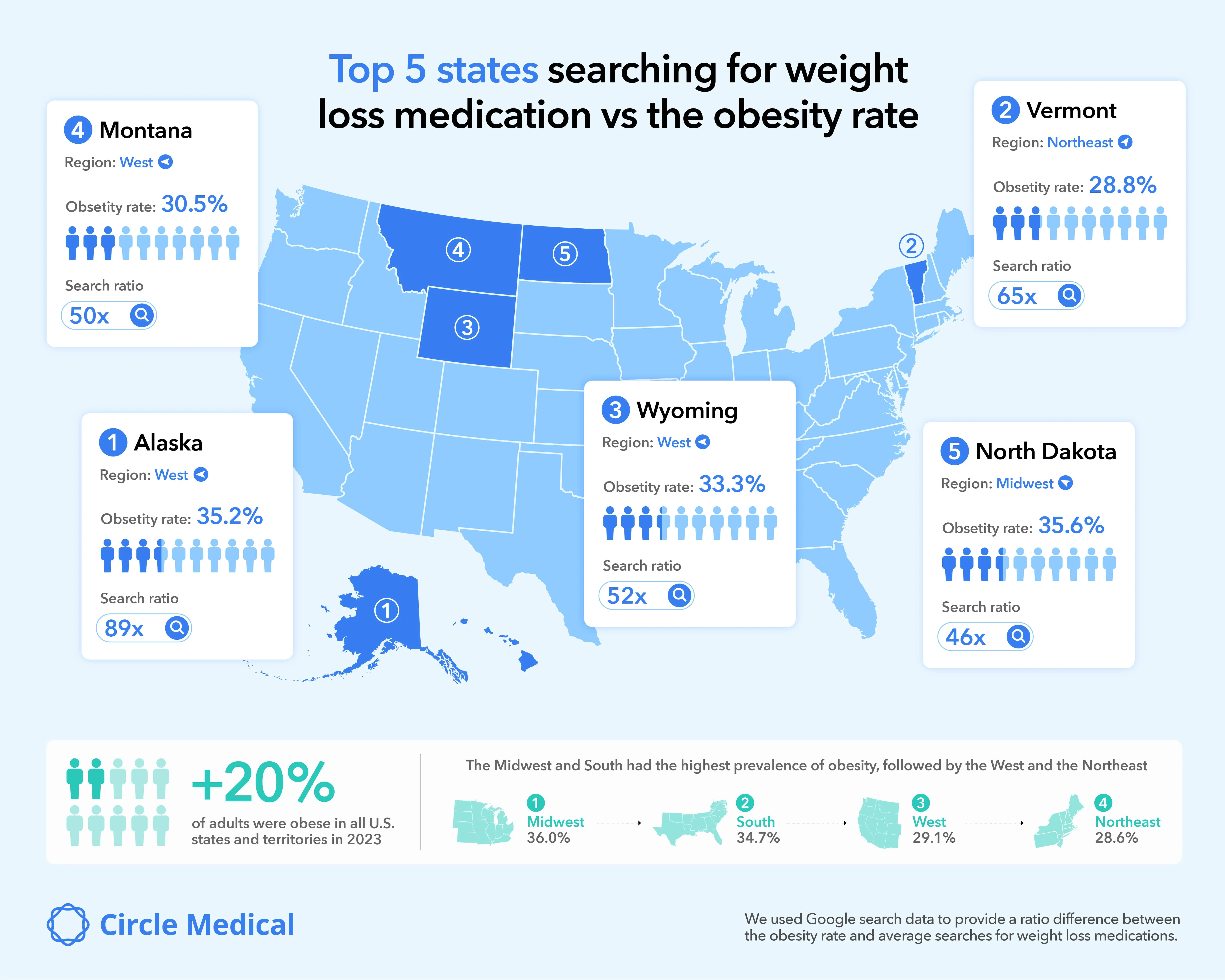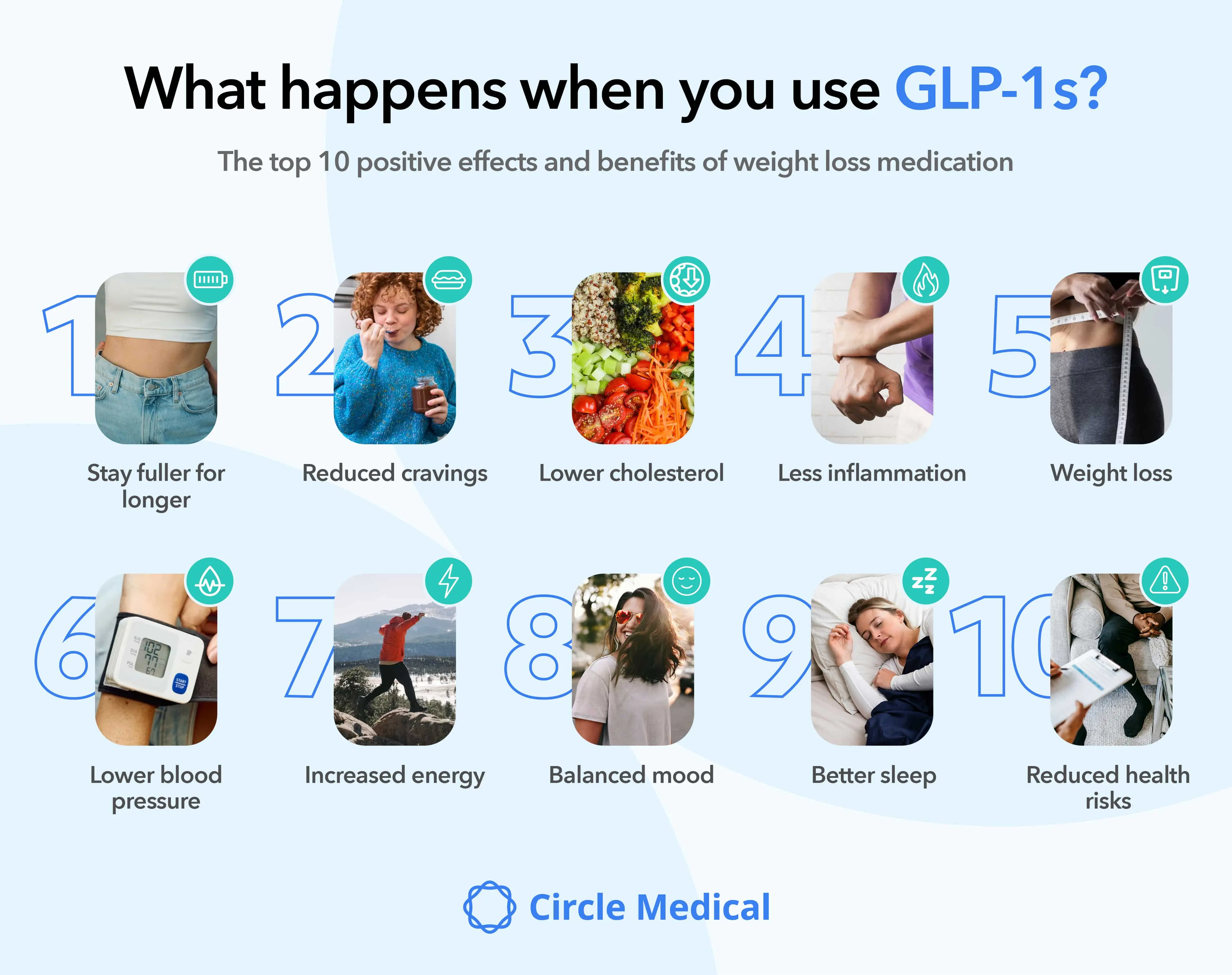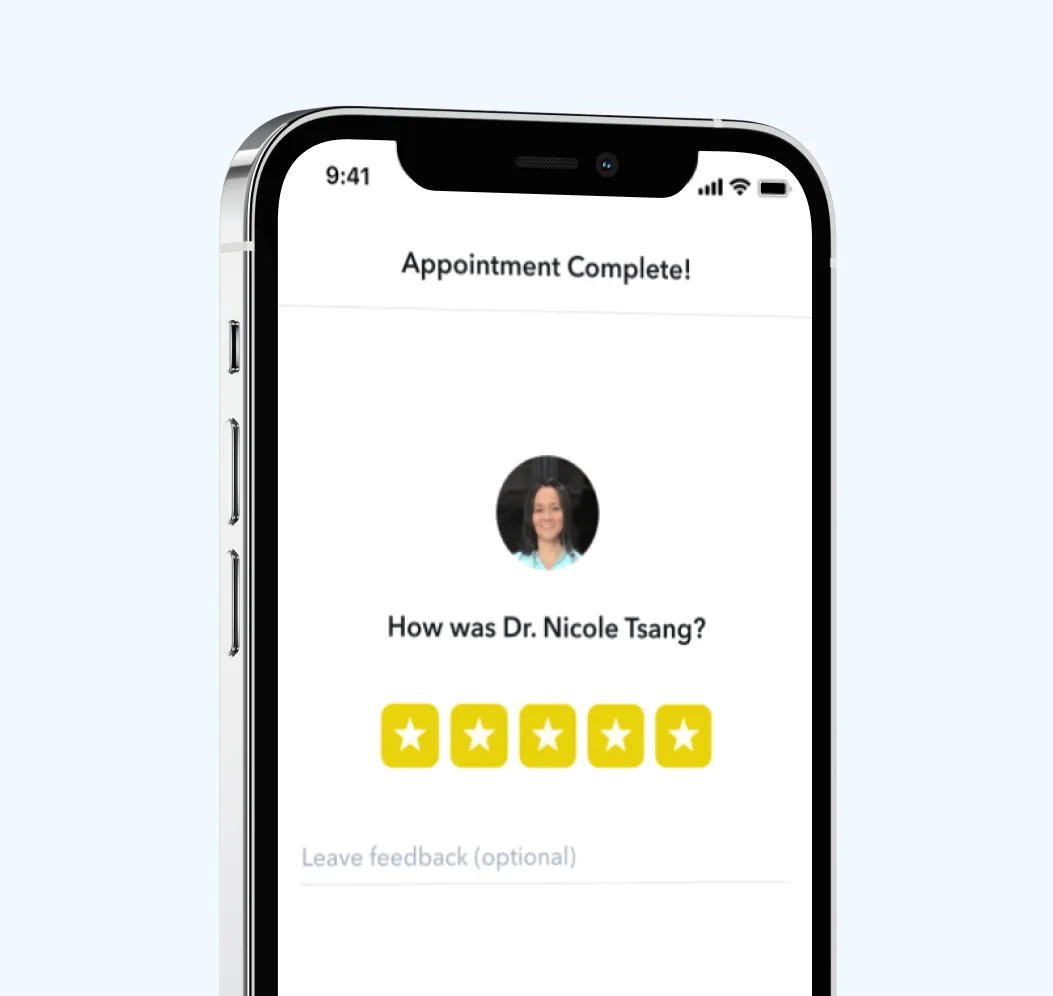All posts
Who Really Needs Weight Loss Drugs? Why Responsible Use Matters

Circle Medical Staff
Sep 9, 2025
4-6 min

Who Really Needs Weight Loss Drugs? Why Responsible Use Matters
Weight loss injections are becoming increasingly popular in the United States. At Circle Medical, we prescribe these medications, but only when guided by data, care, and when clinically appropriate. They’re powerful and effective, but they aren’t meant for everyone - and certainly shouldn’t be used as a quick-fix.
Obesity remains a major public health issue, with four in ten adults now classified as obese 1. From 2010 to 2024, obesity rates rose by 14% 2. However, since 2020, those numbers have begun to stabilize - a shift that may be linked to the growing availability of GLP-1 medications. Severe obesity rates in particular have started to decline since 2021, coinciding with when these medications became more accessible.
Who is gaining access to these medications and who isn’t?
At Circle Medical, we’ve examined the data to better understand how GLP-1s are being used and what responsible prescribing should really look like.
Prescriptions are rising faster than obesity rates
GLP-1 prescriptions for weight loss have soared, increasing nearly 600% in just six years. Today, roughly 4% of the U.S. population (about 13 million people) are taking them to manage obesity or Type 2 diabetes. 3.
However, the patient profile is changing. In 2019, only 4% of adults who had been prescribed a GLP-1 had a diagnosis of obesity without diabetes. By 2024, that figure had jumped to 17% - a relative increase of 344%.
Yet, despite this spike in demand, more than 80% of adults living with obesity still aren’t receiving any form of treatment, whether that be medication, surgery, or behavioral support. 4
Since 2010 5, obesity rates have risen by 14% but GLP-1 prescriptions have surged at a much higher rate. This reflects two key trends: more people with longstanding obesity are finally gaining access to the medical support they need; while at the same time, a growing number of prescriptions may be going to individuals who may not meet clinical criteria.
This imbalance is concerning as it implies that those who could benefit from treatments still aren’t receiving it, while others may be using these powerful medications without a clear medical need.
A mismatch between demand and need
Who is being overprescribed weight loss medication? Who might be missing out?
Search trends reveal a surprising divide. Many states with relatively low obesity rates show disproportionate interest in GLP-1 medications, while states with higher obesity rates show far less.
For example, states like Alaska, Vermont, and Montana - with obesity rates between 28% and 35% - show search interest up to 88 times higher than expected based on their population and obesity levels. Meanwhile, states like Texas, Illinois, and Virginia - where obesity rates reach 36% - show minimal interest.
This suggests that curiosity around GLP-1s may be driven more by aesthetics, societal pressure, or cultural trends, rather than a medical need.
This disconnect raises concerns about education, equity, and the growing normalization of pharmacological solutions for non-clinical goals.

Why excess demand poses a risk
The overuse of GLP-1 medications among those who don’t meet the clinical criteria isn’t just a supply issue, it’s a safety concern.
Dr. Pinchieh Chiang, clinician at Circle Medical and American Board of Obesity (ABOM) certified doctor, emphasizes: “Taking GLP-1s without medical need can lead to unnecessary side effects such as nausea, digestive discomfort, and nutrient imbalances. It may also lead to unrealistic expectations around weight loss and distract from the lifestyle changes needed for long-term health.
“When GLP-1s are overprescribed or used by those who don’t need them, it can create shortages for patients who truly depend on these medications. That’s why, careful evaluation and responsible prescribing are more important than ever as demand for weight loss drugs continues to rise.”
Medication as a tool, not a lifestyle shortcut
At Circle Medical, we align with the Obesity Medicine Association’s definition of obesity: a chronic, progressive, and treatable disease. This shapes our patient-centered approach, where GLP-1s are considered only after a thorough evaluation. Our intake involves two visits: the first explores a patient’s weight history, health conditions, and lifestyle; the second screens for underlying factors like mental health and sleep issues. Lab work, medication reviews, and nutrition or activity goals are also assessed before determining if medication is clinically appropriate.
Dr. Pinchieh Chiang explains:
“GLP-1s help regulate appetite and reduce cravings, making it easier to build healthier habits. But they’re not a magic bullet. The real goal is sustainable change - not just weight loss.
“We encourage patients to pay attention to their body’s response, especially early on. Report side effects like nausea or dizziness, and keep in regular contact with your care team. That’s how you get the most from these medications safely and effectively.”

Many patients find that while using GLP-1s, they naturally start reaching for more nutritious foods, feel more in control of their cravings and begin to move more. But, to achieve those outcomes safely, ongoing medical support is essential.
Dr. Chiang adds: “We’re not just helping people lose weight, we’re helping them to build a healthier relationship with food, sleep, energy, and movement. That means tracking mood, energy levels, habits - not just pounds lost.”
![]()
A powerful medication that requires responsibility
There’s no denying the life changing potential of GLP-1 medications in treating obesity and diabetes. But, as demand continues to surge, we must be careful not to let these tools become the latest shortcut to an aesthetic ideal.
At Circle Medical, our commitment is clear. We use these medications as they were intended, to support patients who meet medical criteria and are ready to make meaningful, sustainable changes to their health.
When used responsibly, they can be transformative. Anything else risks diluting their effectiveness and purpose.
Are you currently prescribed weight loss medication and interested in monitoring its impact on your lifestyle habits? Download our free habit tracker to support your progress.
Methodology:
Monthly search volume data for terms related to weight loss medications were collected to represent actual interest in GLP-1 drugs across states. Expected interest was estimated based on the number of individuals with obesity in each state. The ratio between actual search volume and expected interest was then calculated to identify disparities between demand and obesity prevalence.
Circle Medical Providers must meet all of the following standards:
-
Exceptionally qualified in their field
-
Board-certified
-
Deeply empathetic for patients
-
Follows evidence-based care guidelines
-
Embracing of diverse patient backgrounds
-
Impeccable record of previous care
400+ Primary Care Providers.
100% Confidence.
No matter which Provider you choose, you will be seen by a clinician who cares deeply about your health and wants to help you live your happiest, healthiest life.
Circle Medical Providers are held to an exceptionally high standard of compassionate, evidence-based care.
Book Appointment

